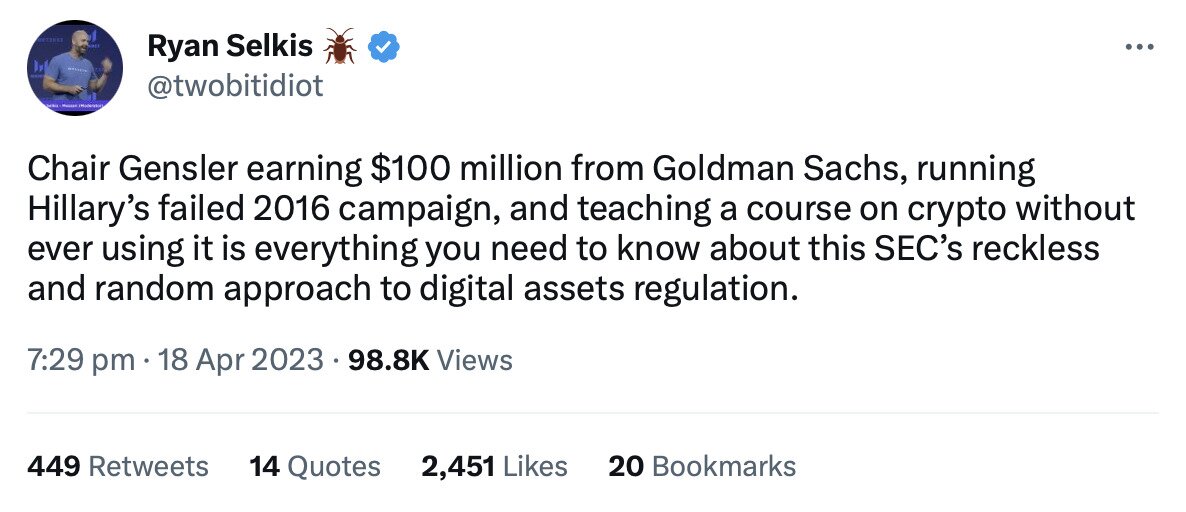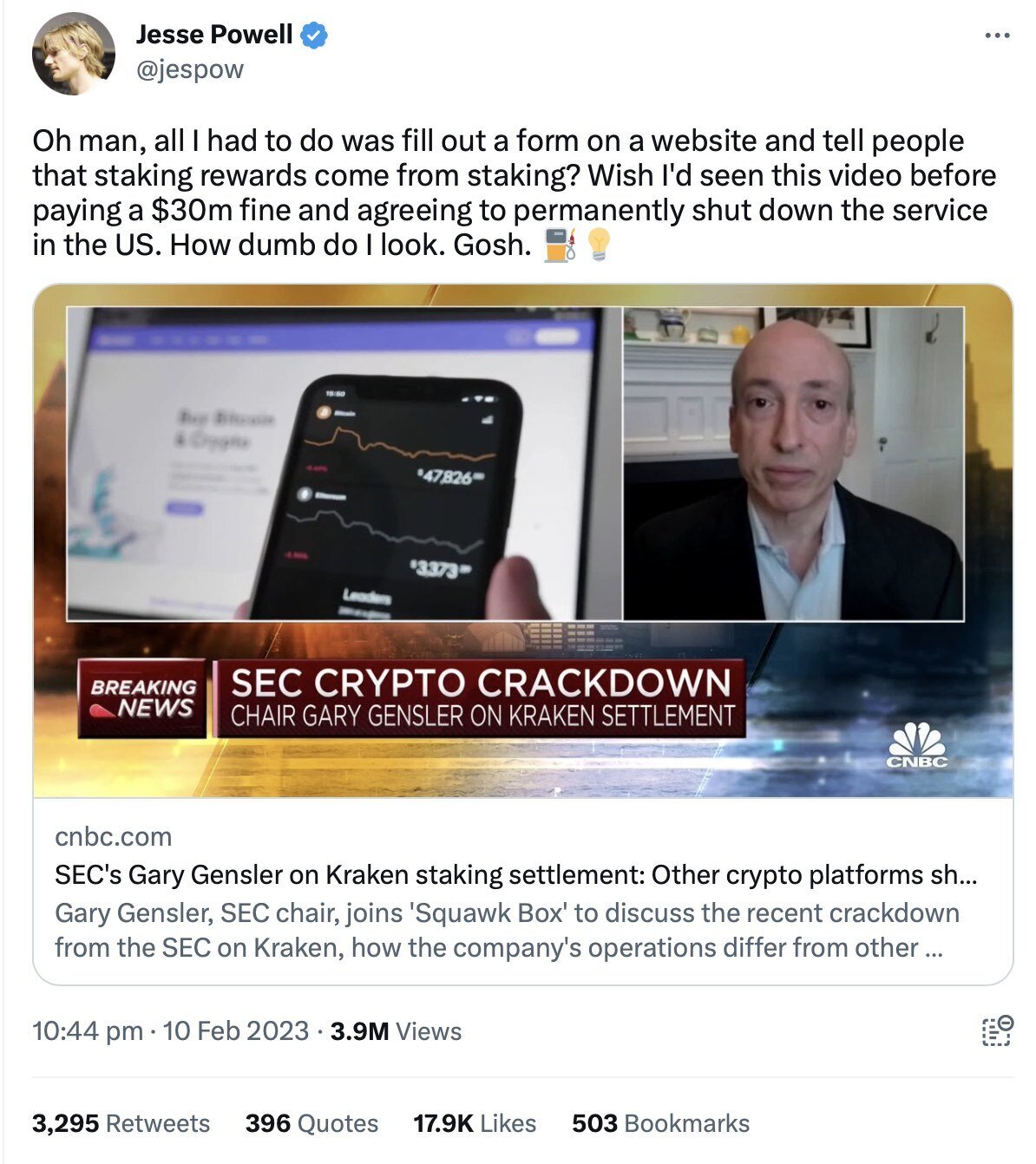- >News
- >Is Ethereum a Security? SEC Gensler Won’t Say and It’s a Problem for Crypto
Is Ethereum a Security? SEC Gensler Won’t Say and It’s a Problem for Crypto
Crypto goes barely a week without the Securities and Exchange Commission casting a long, dark shadow over its activities, and this week has been no exception. This time, it’s SEC Chairman Gary Gensler in particular who has raised worrying questions for the industry, when he appeared before a congressional hearing on Tuesday and failed to provide a non-ambiguous response to the question of whether Ethereum is a security or a commodity.
Gensler’s lack of clarity quickly raised alarm bells within the cryptocurrency community. Many observers argue that the chairman’s evasiveness highlights how the SEC is making things up as it goes along, launching enforcement and legal actions almost arbitrarily, without providing cryptocurrency firms, startups and projects with a clear means of being compliant with the law. However, while there’s truth in this argument, Gensler’s vagueness before the United States House Financial Services Committee this week points to other possibilities.
On the one hand, it’s likely that Gensler doesn’t want to say anything public on the securities-or-commodities issue while the Ripple-SEC case is still awaiting a decision (for fear of undermining the regulator’s chances). On the other, his waffling also raises the unsettling possibility that the regulator is planning other similar actions, and that Ethereum — and/or the exchanges and platforms which transact in Ethereum — is involved. If so, this may end up being very bad for altcoin prices, which have already given up plenty of ground to Bitcoin in recent weeks.
Gary Gensler Doesn’t Want to Say Whether Ethereum is a Security or Commodity, At Least Not Yet
It’s worth looking more closely at Gensler’s evasion of the question put to him by Representative Patrick McHenry, since his skirting entirely around it speaks volumes about the SEC’s current, counterproductive stance towards crypto.
Patrick Henry: “Is ether a commodity or security?”
Gary Gensler: “It depends on the facts and the law and if there’s a group of individuals […] and so, Mr Chair, I think you would not want me to prejudge, because –”
Henry: “But you have prejudged on this. You’ve taken 50 enforcement actions. We’re finding out as we go, as you file suit, as people get Wells notices on what is a security in your view, and your agency’s view. I’ve asked you a very simple question about the second-largest digital asset. What is your view?”
Gensler: “And my view is, if there’s a group of individuals in the middle that the public is anticipating a profit based on their efforts –”
It’s at this point that Patrick Henry interrupts Gensler again in order to highlight the fact that the SEC and the Commodity Futures Trading Commission (CFTC) evidently disagree on which cryptocurrencies are commodities and which are securities (e.g. the CFTC has said that ethereum — and also stablecoins — are commodities). By extension, Henry also takes the opportunity to berate Gensler for the confusion this kind of contradiction has caused.
Much of the crypto community has also responded to Gensler’s remarks by highlighting just how unpredictable the SEC has been in taking enforcement action against various cryptocurrency firms and organizations. For example, Messari founder Ryan Selkis described the regulator as taking a “reckless and random approach to digital assets regulation.”
Source: Twitter
These are views echoed by much of the cryptocurrency community, with the prevailing sentiment being that the SEC wants to severely restrict (or more or less eradicate) the US cryptocurrency industry. Indeed, the regulator has been on something of a mission in the past few months, having launched or threatened proceedings against the following entities:
-
Bittrex
-
Justin Sun (Tron Foundation, BitTorrent Foundation, Rainberry)
-
Do Kwon (Terraform Labs)
This is not an exhaustive list of the individuals and/or organizations that the SEC has charged this year, but it provides some indication of how the regulator has ramped up its crypto game this year. Indeed, the SEC doubled the size of its cryptocurrency enforcement unit in 2022, which also saw a 50% increase in the number of enforcement actions the regulator took compared to 2021 (it’s very likely that this year will witness another significant increase).
Yes, it’s entirely arguable that at least some of the above-mentioned entities were long overdue a date with the SEC, which has actually made no secret of its views that most securities are liable to be considered as securities (despite Gensler’s non-remarks this week).
But the issue for crypto is that, as many have complained, there is no clear way for companies within the space to register with the SEC. This is why there’s an overriding sense that the regulator is simply out to clamp down on the industry, as opposed to working constructively with it.
Kraken founder Jesse Powell posts a sarcastic tweet in response to Gary Gensler’s claim that cryptocurrency firms can easily register with the SEC on the regulator’s website. Source: Twitter
Future Legal Actions?
Yet the worry for cryptocurrency in general and Ethereum in particular is that, as vague as they were, Gensler’s remarks before Congress were an indication that the SEC will be filing many more enforcement actions in the coming weeks and months. In particular, some observers (including one attorney) have suggested that Gensler didn’t want to give a clear answer to the Ethereum question because he didn’t want to have to recuse himself in any future case or action (i.e. exclude himself from giving testimony because of a possible conflict of interest).
Such an explanation seems more credible than any claim that Gensler and the SEC simply don’t know what they’re doing, and that they’re just making things up as they go along (as Patrick Henry seemed to suggest in his line of questioning). In fact, Gensler admitted as much in one of his responses to Henry, stating that “I think you would not want me to prejudge.”
This suggests that more cases are coming and that they potentially involve Ethereum, which Gensler did not want to publicly “prejudge” because it will be involved in an action against some exchange, platform or foundation. And for some people within the cryptocurrency community, the SEC could end up targeting almost anyone next.
Source: Twitter
However, as disturbing as this all seems, the cryptocurrency industry may not necessarily face a devastating regulatory onslaught in the next few months and years. For one, Ripple may end up winning its case against the SEC, something which would weaken the regulator’s hands and make it reluctant to pursue other similar actions. Secondly, a reaction against the heavy handedness of Gensler and the SEC has developed in Congress, with a Republican lawmaker introducing a bill earlier this week that would restructure the SEC and remove Gensler as Chairman.
While such a bill, if passed, may not be enough to provide the cryptocurrency industry with the clarity it needs, it could end up becoming a first important step on the road to certainty. And as Gensler’s remarks and actions have shown recently, there’s no doubt that the industry needs someone in power to take such a step.





